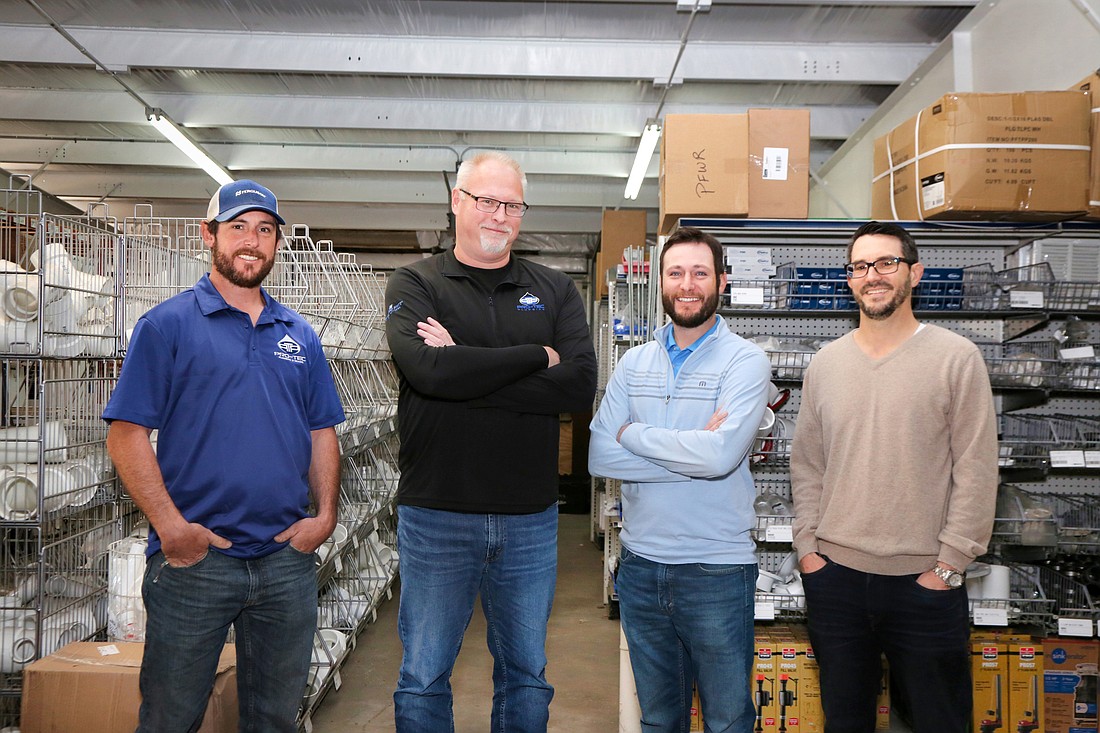- March 13, 2025
-
-
Loading

Loading

Finding employees is a common challenge for many businesses, especially companies in the trades. Naples-based Pro-Tec Plumbing decided to take a proactive approach to the problem, in launching its Technician Apprenticeship Program.
“The plumbing labor pool is pretty shallow,” says Brian Finger, the general manager of Pro-Tec Plumbing. “There just aren’t a lot of plumbers out there. So we came to the conclusion that one of the best ways to do this is to grow our own workforce, and in order to do that, we really needed to have an exhaustive, fully comprehensive program.”
Pro-Tec currently has three apprentices about to start the program. No plumbing experience is needed, but candidates must have a high school degree or GED, basic math skills and the ability to handle the physical demands of the job. Several organizations in the region, from community foundations to chamber of commerce-based groups, operate workforce training and apprenticeship programs. Some do it in conjunction with businesses, particularly in creating a curriculum. But few companies have assembled a comprehensive program like Pro-Tec did, independent of other organizations. (Pro-Tec uses an online apprenticeship program available through the Plumbing-Heating-Cooling Contractors Association for the classroom portion of the program.)
‘You can accept all the work you want, but if you don’t have the people to be able to satisfy it, your reputation will go down because you’ll make a mistake.' Brian Finger, Pro-Tec Plumbing
Candidates chosen for the Pro-Tec apprenticeship program work in the field as a paid employee during the day, under the guidance of a journeyman-level plumber — a trained plumber who has completed an apprenticeship under a master plumber. Apprentices then take online classes during evenings or weekends. The traditional apprenticeship program lasts four years, but there’s also an accelerated option that takes about 18 months. When apprentices complete either program, they are nationally recognized as journeyman plumbers.
These efforts to grow its own workforce will cost Pro-Tec $1,700 a year per apprentice for the traditional program and a total of $2,400 per apprentice in the accelerated program. Pro-Tec pays upfront for the classes and then holds back a small portion out of the apprentice’s paycheck each week. Once they hit certain milestones in the program, the apprentice gets that money back.
It’s a cost Finger thinks will be well worth it. Not only will the program give Pro-Tec access to talent, but it will also allow it to train the new employees on the company’s standards and procedures from the get-go. With retention rates high in the trades, that’s a significant factor.
“When you’re reprogramming someone who’s been at a different company, it’s usually corporate culture that you have to reprogram because plumbing is plumbing,” says Finger, 51. “So we’re teaching them how we want things done from the very beginning.”
Finger says the company could feasibly have seven to 10 apprentices in the program at any given time. It all depends on how many journeyman plumbers Pro-Tec has on staff to provide that in-the-field training and how much work is available for those training opportunities.
The apprenticeship program isn’t the only way Pro-Tec works to attract and retain employees. The company — with about 45 employees — recently established a Career Progression Plan that lays out the steps and skills required for staff to move from entry-level roles up to positions where they work alone and maintain their own truck.
“We’re trying to give opportunities for advancement, so hopefully, they don’t look at plumbing as a dead-end road,” Finger says. “Plumbing has a lot of routine to it. If you can give them some things to look forward to and aspire to, it keeps them loyal, it keeps them sharp and it keeps them wanting more.”
The company also recently made a move to guarantee 40 hours of pay per week for its employees at their respective hourly rates (which vary depending on experience level), even if they haven’t reached 40 hours of scheduled work in a particular week. This removes some of the financial uncertainties technicians can face when workloads fluctuate.
It all ties together to help build loyalty and longevity at the company, something Pro-Tec needs to be able to keep up with the demands of its industry. Employment of plumbers, pipefitters and steamfitters is projected to grow 4% from 2019 to 2029, according to U.S. Bureau of Labor Statistics data. But such factors as an emphasis on four-year college at the high school level means not enough young adults are going into fields like plumbing to fill those available slots.
“We turn away work,” Finger says. “You can accept all the work you want, but if you don’t have the people to be able to satisfy it, your reputation will go down because you’ll make a mistake. We could double [our workload] tomorrow by making three phone calls if we had enough plumbers and infrastructure to do it. We’re in demand, but we can’t just say yes to everybody. … If we beef up our workforce and get a more robust technician crew, we’ll be able to say yes to more folks.”